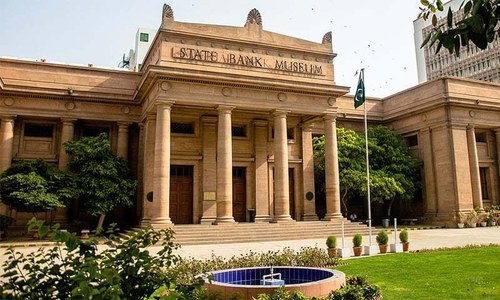THE State Bank of Pakistan (SBP) advised banks, microfinance banks (MFBs) and development financial institutions (DFIs) on April 22 to suspend the distribution of profits by way of dividends in any manner (cash or stock) for the quarter ended on March 31 and the half year ending on June 30.
But the trouble is that MCB Bank, United Bank, Habib Bank and Allied Bank have already unveiled their first-quarter financial results and declared cash dividends. A large number of investors who bought these shares to earn dividends, which inevitably increased stock prices, are now grumbling.
The central bank realised its mistake and issued a clarification afterwards: “The banks that approved the dividend for the March quarter on or before April 22 are allowed to implement the dividend pay-out decision taken by their respective boards.”
‘We expect banking sector earnings to fall by 8pc year-on-year in 2020’
The SBP clarified that these banks will not declare dividend for the quarter ending on Sept 30. The bar on dividend payments is meant to conserve capital and further enhance the lending and loss absorption capacity of banks, DFIs and MFBs, the SBP said, adding that it had announced a host of regulatory relief measures through various circulars on March 26.
Those measures included lowering the capital conservation buffer (CCB) and the relaxation in the criteria for the rescheduling/restructuring of loans. “The aim of those regulatory relief measures is to boost the lending capacity of banks, avoid any adverse impact on their asset quality and ensure a continuous flow of credit to support economic activity to mitigate the impact of the Covid-19 pandemic,” it said.
The bar on dividend comes on the back of a surprise move by the SBP early in April to cut the policy rate by 200 basis points to nine per cent, making it a 425-basis-point cut so far in 2020. But what may be good to support the sagging economy has not exactly pleased the investors. “It’s better to be a borrower than a bank shareholder,” grunted one.
The SBP governor, meanwhile, appears pleased with the policies he has adopted: “The central bank stopped lending directly to the government to help plug its budget deficit, switched to a market-based exchange rate and took other measures to improve external and fiscal imbalances to help shore up the economy’s defences in 2019,” the governor told Bloomberg.
If it were so, it would be perhaps for the first time that the central bank had freed itself of the clutches of the government of the day and those who wield political power to coerce banks to lend money and later strike it off as part of their infected portfolio.
But the banking sector is no longer the investors’ favourite it used to be until recently. Among the two dozen banks that are listed on the stock exchange, the five biggest banks — MCB Bank, Habib Bank, United Bank, Allied Bank and National Bank of Pakistan — maintain strong balance sheets. As the stock market has sunk, so have their share prices. MCB Bank was trading at Rs210 in February 2019, but it has now dropped to Rs158. Similarly, Habib Bank has declined to Rs102 from Rs135, United Bank to Rs103 from Rs150, Allied Bank to Rs80 from Rs112 and National Bank to Rs28 from Rs46.
A little over a year ago, after the monetary policy committee’s meeting on Jan 31, 2019, the SBP had announced an increase of 25 basis points in the key interest rate to 10.25pc, taking the cumulative hike from January 2018 to 450 basis points. Compare that to the 425-basis-point reversal in just the first four months of the current year. Its impact on the banks’ bottom lines can be judged even without looking at their balance sheets.
Topline Securities stated in its banking sector report on April 21: “We have further revised down our banking universe earnings forecasts by 14pc for 2020 (estimate) and 28pc for 2021 (forecast) where we incorporate a higher-than-expected decline in the Karachi Interbank Offered Rate (Kibor) and treasury bills/Pakistan Investment Bonds (PIBs) yields and secondly revised the outlook on deposits, advances, provisions, non-funded income, administrative costs etc, keeping in view the implications of the pandemic crisis and lockdown.”
The analysts said: “We now expect our banking universe earnings to fall by 8pc year-on-year in 2020 (estimate) and 7pc in 2021 (forecast) compared to our March 4 estimate of an increase of 11pc year-on-year in 2020 (estimate) and 10pc year-on-year in 2021 (9forecast). Banks with lower current accounts over total deposits were likely to be impacted less given that the decline in the interest expense component would provide cover for the fall in interest earned. Moreover, falling treasury bills’ yields to 8.5pc from 12.3pc in the 30 days (to April 21) would also affect the net interest margin of banks,” Topline Securities concluded.
BIPL Securities stated in its April 17 report that the Jan-March quarter was expected to be challenging for banks under their observation as the profitability on the recurring basis was expected to contract slightly. However, the absence of the one-off tax liability was likely to save the day on the after-tax basis where earnings after tax were expected to grow by 23pc in the first quarter of 2020 year-on-year. “However, with the SBP cutting the discount rate by another 200 basis points in a surprise move, the price performance (of banks) may remain under pressure,” it affirmed.
Foreign investors who were major buyers of banking stocks believing them to be net beneficiaries of the 2019 rising interest rates have been major sellers this year with a net portfolio outflow of a staggering $195m in the current year to day.
Published in Dawn, The Business and Finance Weekly, April 27th, 2020















































